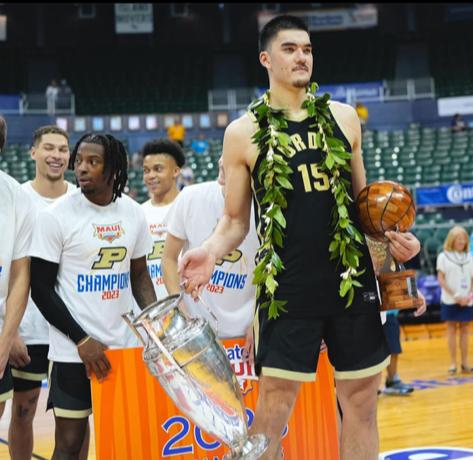At 7 feet 4 inches tall and about 300 pounds, Zach Edey is a formidable presence who draws attention wherever he goes. In a throng, his mere existence sets him apart. As a renowned college basketball player, he is a constant source of requests for interviews, picture opportunities, and autographs, demonstrating his enormous talent and broad appeal.
He accomplished a remarkable feat last season by winning every major Player of the Year award in NCAA history. With his incredible numbers—more than 750 points, 400 rebounds, 70 shot blocks, and 50 assists in a single season—Edey cemented his legacy in the annals of sports history. Despite leading Purdue to the number one seed in the NCAA tournament, Fairleigh Dickinson’s shocking upset in the opening round ended their run.
In an attempt to win a championship, Edey decided to return to Purdue for his final season instead of making an NBA draft selection. Even though he is well known, he hasn’t made full use of the name, image, and likeness arrangements that changed collegiate sports since the NCAA changed its policy in July 2021, making it possible for athletes to get endorsement deals that were previously exclusive to professional athletes.
Why Zach Edey’s gains from NIL are limited
To fully utilize his basketball talent, Edey must overcome two obstacles. First of all, his Canadian citizenship presents a challenge, and secondly, the strict enforcement of US immigration laws severely limits the opportunity to earn money while attending school. These two obstacles make it more difficult for Edey to use his abilities for profit inside the educational system.
Impact of F-1 visa law on NIL
As to Gabriel Castro, a Senior Associate at BAL, an immigration law firm that specializes in similar situations, the present legal structure places constraints on athletes like Edey that limit their prospective profits. Three paths exist for foreigners to pursue education in the United States, as outlined by the Immigration and Nationality Act of 1952. Remarkably, according to the NCAA, 13% of Division I athletes are foreign-born, with a noteworthy 17% of them participating in basketball. This illustrates the widespread influence and frequency of foreign athletes in college sports.
Castro shared;
“The F-1 student visa regulations are going back decades. I don’t think they really conceived the idea of student-athletes really being important when they were making these decisions. But they definitely didn’t know that NIL would allow the athletes to be paid,”
he further shared “The NCAA didn’t really put out compliance rules and it’s created a lot of uncertainty in that market, not even thinking on how it would affect international students,” an article from sportskeeda.com mentioned.
Congress has shifted its attention to a critical issue: in October, Senators Richard Blumenthal (D-Conn.) and Pete Ricketts (R-Neb.) proposed a bill to amend immigration regulations, permitting foreign athletes to enter into NIL (Name, Image, Likeness) partnerships in the US. In the meanwhile, a more comprehensive NIL bill including an immigration clause was proposed by Senator Chris Murphy (D-Conn.) and Representative Lori Trahan (D-Mass.). This was a good thing for Edey, who had two days to take advantage of the fact that the Boilermakers were visiting his hometown of Toronto to play Alabama.
Read More News
Shericka Jackson Talks Candidly About Her Childhood Struggles

